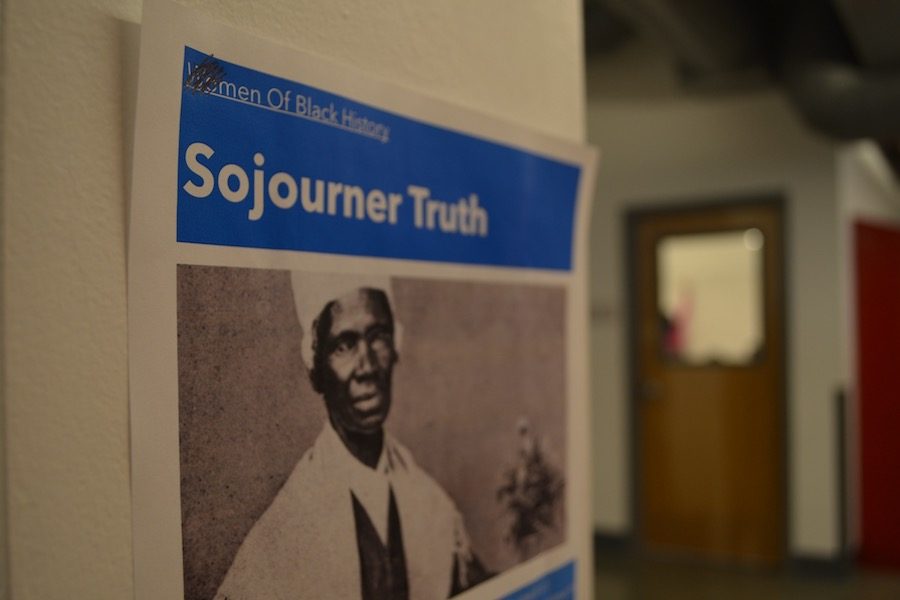Posters of women for Black History Month are vandalized
REMEMBRANCE: At top left corner of poster, the “Wo” is crossed out in “Women of Black History.” It was one of several that were vandalized in second-floor hallways.
May 11, 2018
One Friday morning, junior Honor Fuchs discovered that posters she had hung up throughout the second floor hallway in honor of Black History Month had been tampered with.
With the help of English and film teacher Ms. Michelle Crincoli, Honor had designed and put up 24 posters featuring African-American women in history whom she found inspiring, as well as fun facts about each one. Included were former first lady Michelle Obama, Olympic gymnast Gabby Douglas, civil rights activist Ruby Bridges, and author Andrea Lorde.
The posters had the words “National Women’s Month” on them, but on each one, the “Wo” was crossed out. Honor noticed this Feb. 16.
“I wanted to sort of educate the students about black women that I thought were heroic and made a difference in history that a lot of people didn’t know about,” Honor said. “I felt like disappointed in our school community. Like, what the heck?”
Honor took to Schoology.
“If you did this disgusting act to peeve me, congratulations, I’m peeved,” Honor wrote in her post. “Personally I am embarrassed for this school that prides itself on its mentchy students, yet posters of black, female American heroes were vandalized. We learn in class that it is a sin to speak ill of the dead, yet a student at this Modern Orthodox institution vandalized posters celebrating the dead.”
It turned out that the student was not trying to anger Honor or attack women or African-Americans at all. He was, he said, trying to add black men to the mix.
The student, who did not want his name used in this article, admitted to crossing out the “Wo’s,” and in an interview with the Boiling Point, expressed regret.
He said that he did it because he felt that there was a lack of black male representation in the display. He also expected to earn laughs from his friends.
“I saw these posters, and I was just thinking, where are the black males?” said the student. “I think black women are great and they can do things I can’t, but I was just being selfish and thinking about having a good time and making my friends laugh.”
He said he had learned from Honor’s reaction.
“I saw Honor’s Schoology post, and I realized that while it seemed like such a small action, it symbolized bigger things,” he said.
“Looking back, I just have to be more careful. Now I’m realizing that someone had genuine feelings, and the fact that I did this to them triggered those feelings, so I feel bad about that.”
Students and teachers disagreed on whether the student’s vandalism also represented a cultural shift at school.
Ms. Crincoli said it seemed to be symbolic of America’s current political state.
“I was upset that something so positive had a negative ending,” Ms. Crincoli said. “I really don’t know why someone would do that because it’s honestly such an innocent thing that [Honor] did.
“I think it shows that there’s a division in American society, and maybe we have to have a lot more conversations about gender and race and all those things that are sometimes hard to talk about but important to talk about.”
Judaic Studies teacher Rabbi Ari Schwarzberg agreed, and said that the diversity in opinion was a good thing.
“We may have more students now who are resistant to certain ideas that some people categorize under the liberal banner than when I started at this school and maybe even than we had four or five years ago,” Rabbi Schwarzberg said. “To me that’s a wonderful thing, and it shows that Shalhevet can house many different perspectives.”
He added that while the crossing out of the “Wo” was terrible, it might not be indicative of anything about Shalhevet’s culture.
“I don’t think that the people who did this are angry fanatics against anything that stands for women’s empowerment or feminism,” Rabbi Schwarzberg said. “We need to be mature enough an have a macroscopic lens, and to not isolate an incident that’s probably related to 3 or 10 students.”
In her Schoology post, Honor said that the posters would stay up on the walls despite being vandalized.
“These posters are still hanging (except for the few that were thrown out by individuals who did so on their own choosing) because they contain important information about women that made a change in this county,” Honor wrote on Feb. 16 at 10:18 a.m. “I would encourage all to read them.”
The posters stayed up until March 1, she said.
Rabbi Schwarzberg said that the growth in diversity in opinion at Shalhevet provides additional challenges that the school must adapt to.
“We now as a school need to figure out how we relate to one another when we disagree with one another,” he said. “Our school is not immune to what’s going on in society, our school dafka responds to what’s happening outside and we bring that into the discourse of the school which I think is a good thing. We want you guys to be talking about this stuff and we want to learn how to deal with it.”
Honor said that the vandalism coincides with what she feels is a “lack of menschlichkheit” — respect and kindness.
“I feel like there’s been a shift in our school with just a general lack of understanding of other people’s opinions,” she said. “I feel like the school is just trying to engage us in conversations about women of color and sexual harassment, and some people refuse to do that.”
Rabbi Schwarzberg said Shalhevet is acting appropriately in promoting respectful disagreement.
“I think we’ve had several really great Town Halls that have dealt with political and heated topics in a way that was really representative of the just community,” he said. “I really enjoyed Honor’s post. Now would it be better if there was no vandalism, absolutely, but the way in which we’re responding in these moments is I think exactly what we’re supposed to do.”
He said the school probably could do a better job in communicating a zero-tolerance policy for more harmful bullying of any kind.
“What I think we might need to make more clearly, and I don’t know if we haven’t already, is that anything that is damaging both emotionally and physically to someone else is at a zero tolerance,” Rabbi Schwarzberg said.















Ari Greenbeg • May 14, 2018 at 5:21 pm
As an alum of Shalhevet I find this behavior pretty disgusting. Has the responsible student been suspended or expelled yet?